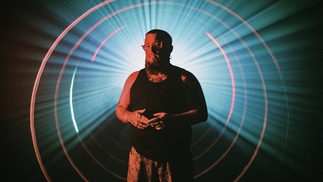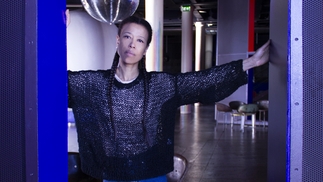On Cue: Hieroglyphic Being
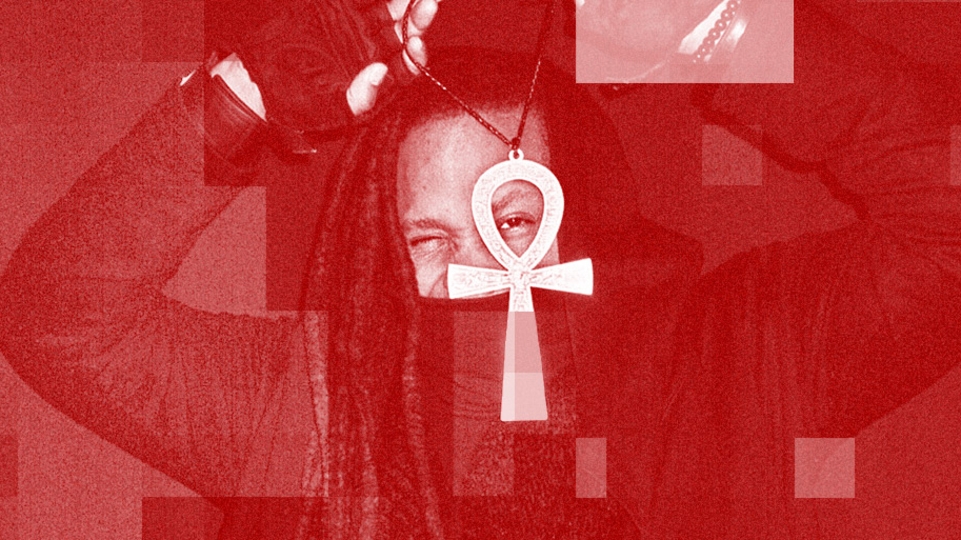
Chicago's Hieroglyphic Being records one hour of fuzzy-and-jazzy live techno for the On Cue mix series, and speaks to Lauren Martin about surviving as an independent artist, life in America, and the spiritual roots of his music
When Jamal Moss walks around Chicago, he sometimes feels like Moondog. He cuts a commanding figure, like an industrial reimagining of the late cult jazz musician and flâneur. Today, like most days, he is dressed in a black hood and heavy boots, with purple cloth tied through his long locs. “I get that all the time,” he laughs with warm self-awareness. “People don’t say nothing usually but, every now and then, someone will come up to me and say, ‘Oh, you’re that cat in the neighbourhood,’ like I’m Moondog, or the Candyman. All the time, people look at me and think, ‘Who is that guy?’”
Moss is Hieroglyphic Being, a Black techno-punk whose music draws on Afrofuturism, jazz, esoteric mythology and his caustic sense of humour. He’s released music on labels like Soul Jazz Records, Ninja Tune and RVNG INTL, which have introduced him to wider audiences, but most of his vast discography is fiercely independent. From selling cassette tapes outside noise shows and acid techno raves in the late ’80s and early ’90s, to the dozens of albums and EPs on his own label, Mathematics Recordings (with its offshoot series of CDr releases on Music From Mathematics), a conservative estimate would put his true album count into triple figures.
In a normal year, it’s not unusual for him to release half a dozen albums of original solo music. This year has been far from normal, and despite being unable to tour and trying to navigate the COVID-19 pandemic as best as any individual can, Moss has been on a tear; between the new year and now, he’s uploaded 18 album-length projects to his Bandcamp page. The second most recent, ‘THE DEEPEST MEMORIES OF MY OWN’, shows us where he’s at right now, and largely where he’s always been — fuzzy-yet-funky techno, with synapse-snapping rhythms and jazzy melodic undercurrents, noted as being “sourced from” a variety of analog formats, like mini-disc and VHS. It’s beautiful, too.
Bluntly, how has he managed to record and release so much music in a year of constant unrest? “I’ve always been a recluse, so I’m not going through the weird social detox of human connection that so many others are,” Moss says candidly. “I feel really bad for people under 35, who are trying to get more out of life and are being shut down. I’m pushing 50,” he laughs, “I’ve done the clubs already. Now, I can just sit here, go into the recesses of my mind and get endorphin boosts from my happier memories.”
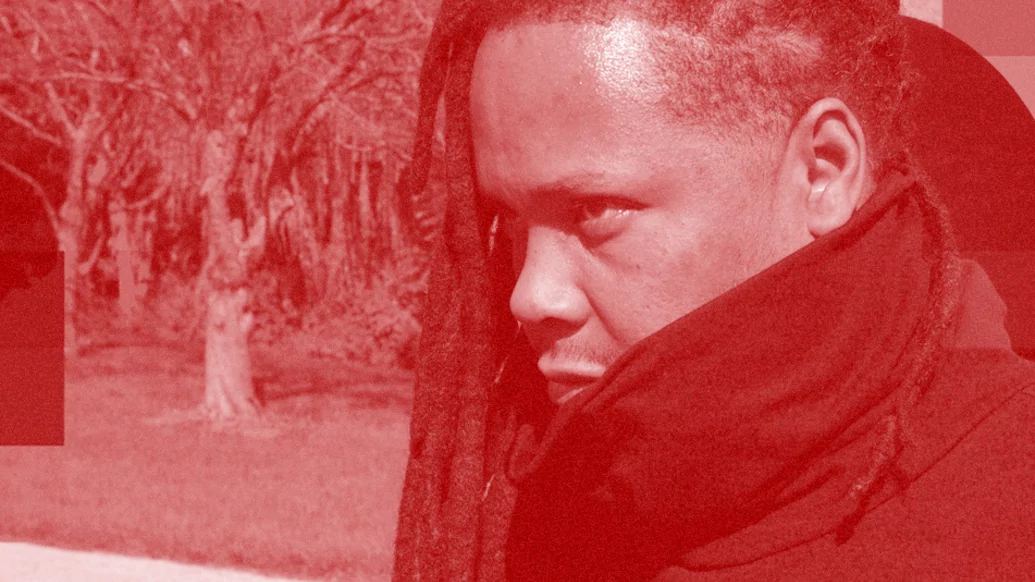
For an artist whose recorded output is developed from live sessions, Moss doesn’t feel creatively out at sea during a gig-less year. He often refers back to his “mentor”, Chicago acid house producer Adonis. When they met in the early ’90s, Adonis “looked me dead in my eye said, ‘This is a business. This is your life. Don’t get caught up in yourself just because you get on a plane to Europe and you’re in front of all these people,’” he recalls. “‘The only difference between somebody who works 9-to-5 in an office and you is the fact that you’re on the road.’ And I never did this [music] just to be on the road. I did it as therapy — that’s why my music can live beyond the road.”
Moss details how, with guidance from Adonis, he’s built up his economic independence as an artist. He owns his own publishing company, and is fastidious about artist rights and owning his master recordings — the sheer volume of his output helps him to make a steady income through digital platforms. “The industry always tries to tell the artist that there’s no money to be made, but there is,” he says passionately. “You’re just giving your stuff away for free, without knowing about branding, publishing, copywriting — the stuff that protects your work. That’s why so many artists are panicking right now, because they’re not on the road and the money’s gone.”
Bandcamp has been a source of income, too, but also inspiration, a testing ground. Every day, he tries to record an album’s worth of material. He tweaks and collates and rearranges, until he feels there’s a record in there, and every now and then, uploads that material to Bandcamp — and waits. The tracks that get the most plays and buys on Bandcamp are the ones he considers for vinyl or tape release; to save money on manufacturing costs, and charge his fans more appropriately for focused output. He’s got hardcore fans that buy almost everything he uploads, though, which he’s affectionately surprised by. Labels have approached him to sign certain digital releases this year, but he’s declined. Doing it for himself is the only way he sees as workable now.
The business of music aside, this has been an instructive time for Moss. He “blew up” his television set a while ago — “I pick and choose what I feed my brain” — and spends much of his time reading, particularly about Afrofuturism, spirituality and futurist theory and fiction. He’s re-reading Alvin Toffler, whose work about “future shock” — the physiological state that human beings experience when they’re unable to understand huge societal changes in short time periods — seems apt for now. A cassette album titled ‘The Future Shock Chronicles Vol 1’, was released on Boomkat Editions this May. Another favourite is Edgar Cayce, a prophetic figure of the New Age movement who, in ultra-brief, believed in using dreamstates to explore the proposed timeless interconnectedness of all subconscious minds.
These readings have long had a profound impact on Moss’s music. His 2015 collaborative album ‘We Are Not The First’, with J.I.T.U. Ahn-Sahm-Bul (the 8-person Journey Into The Unexpected Ensemble, including drummer Greg Fox and members of the Sun Ra Arkestra), refers to the 1971 book of the same name, a sprawling, imaginative tome blending science, mythology and ancient civilizations.
As Hieroglyphic Being, Moss seeks to communicate ideas about interconnectedness: of ancient knowledge and contemporary existence, using fantastical language and esoteric images throughout his discography. His decades-long interest in techno comes from jazz and Afrofuturism, his machine riffs as overlaid sketches of 20th century Black music, itself sketched out from ancient Black storytelling.
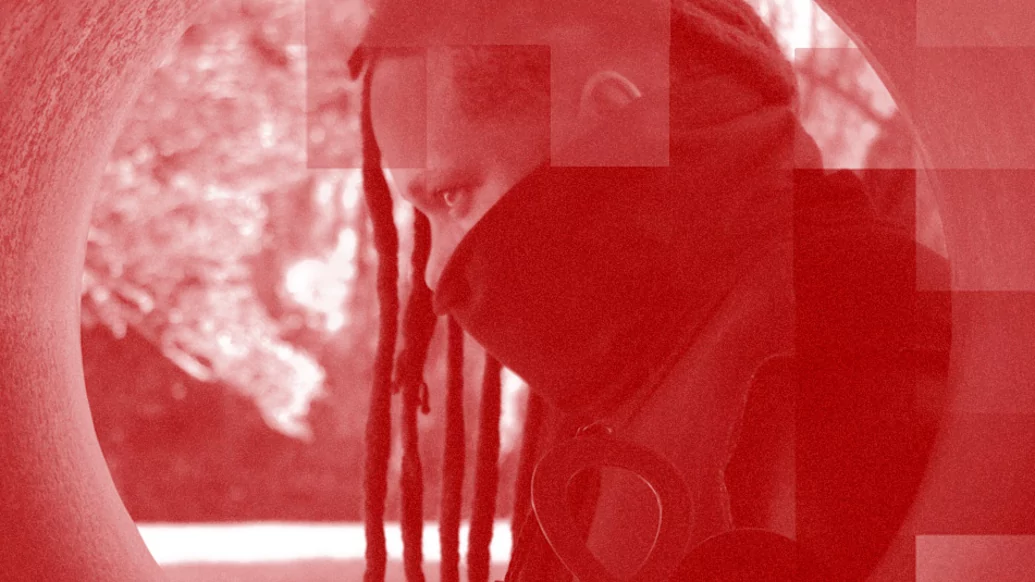
He’s trying to keep himself steady, though. By being reclusive, he risks becoming disconnected from reality, which would jar with his wish for interconnectedness. He realised that dogma doesn’t work, too — his adoptive family were Freemasons, and he came to realise this wasn’t his path — and that speaking seriously all the time can make him seem self-involved.
One way that he tries to combat that is through humour. The title of his most recent album on Bandcamp, after all, is ‘THE SHITTEST SOUNDS U DON’T EVER WANT 2 HEAR WITH SPIRITUAL NAME TITLES 2 PROVE HOW DEEP I AM VOL . 2’. Referencing books in album titles and liner notes allows people to dig for themself, rather than having ideas forced upon them. Another way is to treat the creation, promotion and performance of his music as ways to set intentions. “What you put out into the world is what you get back,” he says.
“I’m not going out there to diss anybody, to put out a violent energy or a disrespectful sexual energy towards women, or anything else that’s going to do harm to society. We need input that will nourish and uplift us, because nefarious forces have created an entertainment industry that treats people as unworthy of care, or unworthy of being seen as fully human. When I leave this world, I want to know that I gave out more positive energy than negative.”
In a year of intense suffering, particularly surrounding racism and state brutality in America, Moss is being attentive to these energies, but “I’m also a Black man in America, so nothing surprises me,” he says bluntly. He’s been drawing new ideas from the same John Coltrane and Sun Ra records for 30 years. He believes that, while we’re experiencing a collective “future shock” during this pandemic, time moves very, very slowly, especially when it comes to justice.
“I’m genuinely not trying to be insensitive towards anyone’s struggles, but I’ve been acclimated, I’m a realist,” he says. “Across racial lines, and especially for poor people, the moment we get a crumb of happiness, or some form of closure, we go to sleep again, and act as if we are part of the rest of society,” he continues. “But in a moment when society is truly tested, we have a shock: all of our fears, hopes and dreams are crushed by the long-buried stress and trauma, and it all kicks in at once; we wake up from a good dream to a nightmare reality. Now, we have to be even more compassionate, even more understanding, or we’re not going to survive.”
This winter, Moss will keep on reading at home and releasing music through his own channels. A friend of his in rural Illinois has been throwing DIY parties at his farm, with its own stage and studio, for college-age kids. “Maybe I can go down there and play some shows, or even just be useful on the farm, you know?” he laughs. “See how this whole America thing works out.”
Tracklist:
'BLACK LOVE ON A EARLY SUNDAY MORNING'
'I'D RATHER HAVE A DREAM THAN A MEMORY'
'I CAN'T ESCAPE FROM U'
'THANKS 4 THE TRACKS U LOST'
'TASHI CHOELING'
'SIGNALS OF A GLOBAL AWAKENING'
'THE ANDROMEDA STRAIN'
'THIS IS 4 THE RAVE BANGERS II (7AM VERSION)'
'TSSUDEW2HSNT2PHDIA'
'NO MORE TEARS'
'THIS IS FROM THE RADIANCE'
'THE LUST WITH-IN'
'POWER & MYSTICISM OF THE BLACK PANTHER'
'THEIR HIDDEN WORLDS'
Second feature photo credit: Michael Featherson

